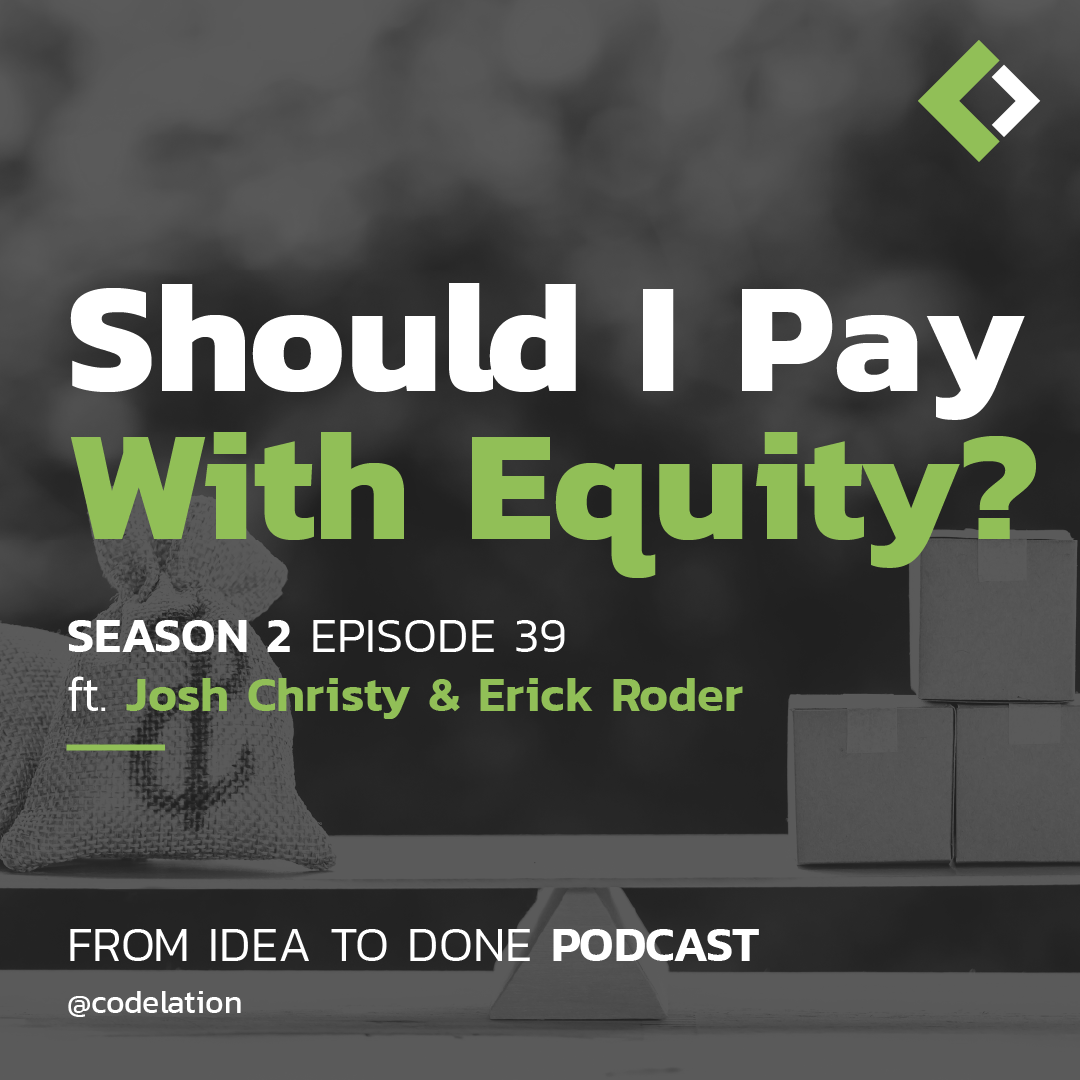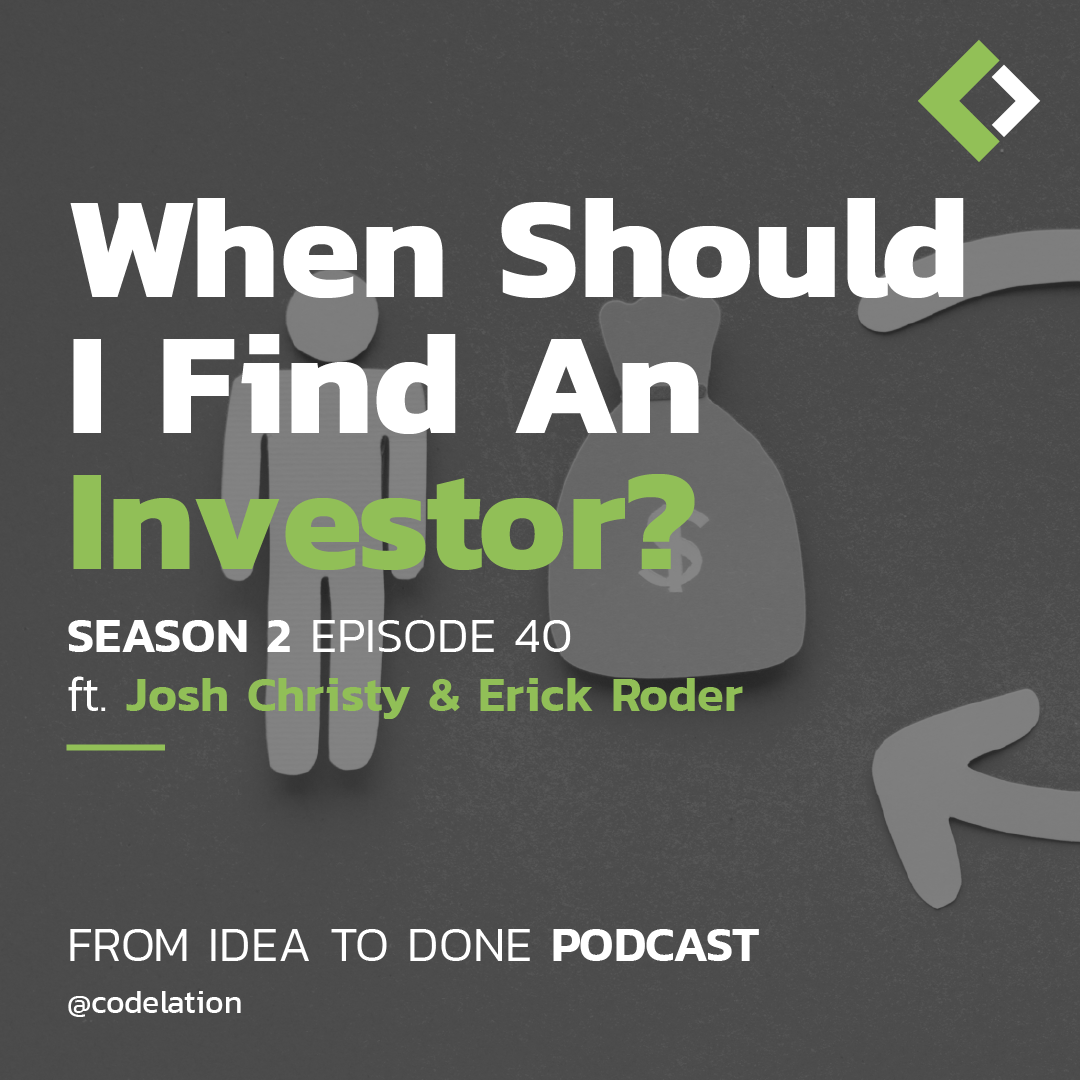When Should I Find An Investor?

Should I Pay With Equity?
September 29, 2020EDUcal ft. Tyler Leidholm
October 13, 2020VO: Get ready for your semi-regular dose of random ideas from the guys at Codelation. We like to talk about big ideas companies that are winning, and those that aren't along with current events in our crazy world of software startups. So come along with Erick and Josh, who challenge you to think big, start small and turn your ideas into something on this episode of, from idea to done.
Josh: Hey everyone, I'm Josh
Erick: And I'm Erick and today's idea is when should you find an investor?
Josh: You know, I, I think that's a good question to ask, and I think it's part of a bigger conversation. Eric, should you find an investor? Um, there's a lot of good reasons for not to seek an investment, which we've outlined in a blog post on our site, and there'll be in the show notes below. Um, you know, but this episode is when should you find an investor? And I think a lot of people look at, you know, I have to get an investment to make my startup work. And that's the only thing holding me back. That's not always true. Um, and I also think that a lot of people look at it through the lens of, you know, they'd go watch shark tank and you've got 10 minutes of video magic. And all of a sudden the company has mark Cuban on board. And that's not, that's not how it works. Well,
Erick: That's not just TV. So you've worked with, you know, startups and growing businesses for the past 20 ish years. How should people actually be looking to find an investor?
Josh: Gosh, that makes me feel older. Um, uh, I think there's a few ways to look at for when to take an investment. Um, and the way I would look at it is to say seed stage early stage or growth stage earlier that you take an investment, the more risky, um, it is for the investor. So you should really start with the end in mind as to what do you want your startup or company to be, you know, think of it as a 2, 3, 5 years down the road. What, what does it look like? What could it be? Because ultimately, you know, if you take an investment from a VC, the path that you're on is to raise more money and ultimately sell the business so they can get a big return that may not be your happy path forward.
Erick: You know, I don't think people, well, that's not always true, but people don't start a business to sell a business. And that's kind of sometimes what VCs are for. I think another part that people don't really think about, and they're like, after they've done their initial personal investments, like what's going to happen if this actually works, like I'm jumping off the cliff, I'm going for it. What if I start making money? What if I've got an idea that investors, people actually want to back? What happens when I have the capacity to buy them out or have them exit? Like, I think it's important to think in your coming more, more on the plant stage of your company, instead of just focusing on the seed stage.
Josh: And it's ultimately the type of investment you take kind of dictates, do you need to buy somebody out or is it equity? Is it debt? Like, there's so many factors that go into it. But if we start with, you know, the seed stage typically, um, the way I look at a seed stage seed stage company is that there's no revenue and sometimes no product. Um, but that doesn't mean that it's just an idea. Um, I don't think that there's many investments happening in 2020 for an idea at this point. I mean, it's, everyone's got an idea and it's the next Uber for dogs, right? It's just an endless number of, of investments. And the one kind of caveat I'd put on that is you have a number of industries that do require heavy capitalization, you know, such as medical tech or something else where you have to go through like FDA testing and phases of testing before you get a product. So, um, typical ways to get an investment at the seed stage would, you know, the kind of running joke is it's friends, family, and fools. Um, so it's, it's the people closest to you. And then also a crowdfunding platforms would be another way to do it,
Erick: You know, and one thing, you know, we deal with a lot and you shouldn't kind of discount is it's important to think about trying or looking for grant money. If you can not ask your mom for $10,000, that's gonna make it like very messy in a couple of years if you fail. But if it's a, you're going to pay taxes forever, you might as well look to see what grants are even available to be, have that be your investor instead of getting an investor in the early stage of your company.
Josh: Yeah, it's definitely good to make sure that you're keeping the Thanksgiving table a safe and sane. So your, your parents aren't, uh, concerned for you. And we're, we're really fortunate, you know, in North Dakota, Minnesota, there's a couple of great state grant programs that do help fund, um, ideas and projects. So, you know, certainly look into those when he can. Um, the next one that we're looking at is early stage companies and early stage companies have typically built out their minimum viable product or their MVP. They usually have a small customer base and they're generating some sort of revenue. Um, this, this funding phase is typically when an angel investor would step in and really help them grow the company. Sometimes you can get the attention of a VC at this point as well. Um, you would also have some interest with like an accelerator, like a Techstars or, um, the holy grail, Y Combinator. Um, but if you're looking for outside money, this is the absolute earliest I'd ever considered taking funds,
Erick: You know, and we see the other end of that spectrum of way too much like, oh, I have the best Uber for dogs. Honestly, Uber for dogs might not be the worst idea, but I don't think I wouldn't fast in it. You know, I, I personally, I don't have a ton of venture capital just yet, but if given the opportunity invest, I think it's much more, I'd be much more interested in just helping making a working model blow up. And that kind of might have to do with my personality. Like I love connecting and, and marketing, but I, having a working model I think is easier to invest.
Josh: Yeah, absolutely. And there's a lot of VCs that won't even get on board until you proved a million dollars in annual revenue. So there's a lot of people that are at that. I just want to pour gas under the fire and let it blow up. Um, the next stage is, is the growth stage and that's where things kind of get fun. You've proven that you have a reliable sales and marketing strategy. Your team is growing. Um, you're able to delegate tasks. You don't want to be doing long-term within your company. And typically you'd be looking at a VC or traditional banking at this stage.
Erick: No, and it's also kind of nice to have like traditional banking as a bargaining chip. Maybe, maybe mark Cuban comes in and he gives you something that you don't overly like he's asking for too much, or it's something that it's more than you're comfortable giving up. It's nice to have a structured bank agreement to say, no, you know, we can go to the bank and get blank. And even in our world too, you know, it's, bank's job to de-risk any investment. And so if you have the ability to get a bank behind you and borrowing money, I think your business is on the right track.
Josh: Yeah. And especially in the software space where banks typically don't understand how intellectual property is an asset, you know, versus a building is an asset it's, it's really tough to value. So having a bank involved in our world is, is a big win. And, you know, I think on that note too, that the longer that you can delay taking funding, the better upside you're going to have long-term, but that can also suffocate growth. Um, you know, the startup that you're working on is not going to be the only thing you do in your lifetime. So balance speed with, uh, speed to market with your growth opportunities. You know, cause it's things are gonna change and they're going to be different and you're going to grow this thing and then it's not going to be your baby anymore. And, you know, just consider all the options and what I've, what I've learned over the last, whatever decade here is that, um, going forward, I would not invest into a company until they've at least proven that the market is willing to pay something for their, their product and that there's a right team in place to grow it,
Erick: You know? And from what I've learned in this space is I should just kind of overall trust you.
Josh: Well, let's say that I've learned what not to do. Let's put it that way. The other thing to note is no matter when you take funding, one of my favorite ways to look, look at funding is can you get your customers to be your funding source? Like, could you go, um, to 10 and sell them lifetime access for $10,000 each to your product? You know, now that's obviously going to depend upon what you're selling and if that's feasible. But if you're trying to, de-risk what you're doing, a good ideas to actually get people to pay for it. So why not go to your, your audience,
Erick: You know, paying customers are the ultimate investors.
Josh: Absolutely. So there you have it really think about what sort of company you want to end up as there's no right or wrong answer as long as you're intentional about it. And thank you for listening. We're hoping that you know of a startup that could use our advice and random thoughts, send them over to correlation.com to hear the next podcast.
Sign up to receive email updates
Enter your name and email address below and I'll send you periodic updates about the podcast.
